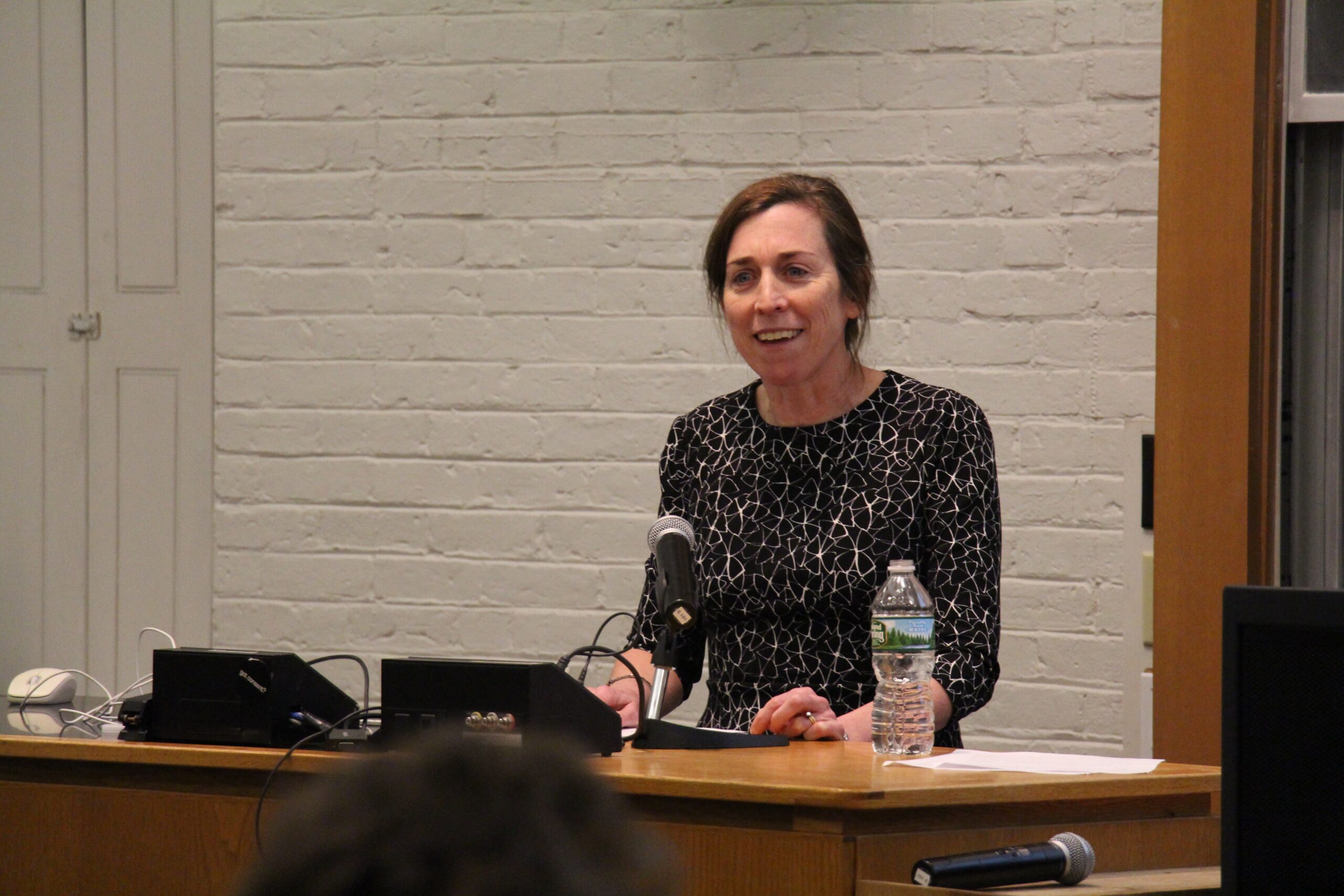Bowdoin alum talks ‘hacking literature’
March 1, 2019
 Mindy Leder
Mindy LederWeaving together literature, biotechnology, philosophy and political theory, Eileen Hunt Botting ’93 took to the podium in the Searles Science Building on Monday evening to deliver her lecture “Shelley, Hawthorne, and the Ethics of Genetic Engineering.”
Addressing Bowdoin students, professors and community members in a packed lecture hall, Botting explored the ethical and political implications of advancements in biotechnology through a discussion of Mary Shelley’s “Frankenstein,” Nathaniel Hawthorne’s short story “The Birth-Mark” and other works she calls “hacker literature” in a talk sponsored by the Peucinian Society.
“Hacker literature hones its attention upon the ethics and politics of biotechnology, especially the artificial hacking or transformation of human life,” Botting said at the lecture. “Frankenstein and the political science-fictions it has spawned are daring provocations to consider the ethics and politics of making artificial life from the perspective of both the creators and the creatures.”
At the University of Notre Dame, Botting, who is a professor of political science, focuses her research on what she sees as the increasingly important ethical and political implications of scientific advancements. At Bowdoin, she majored in philosophy and English and minored in Greek.
“After the European Enlightenment of the 18th century, science has indelibly shaped human experience, including politics,” said Botting in a phone interview with the Orient following the lecture. “Science is also a big part of how we think about ethics today, because we’re grappling with the impact of technology not only on nature out there, but also our own nature as human beings.”
Works of literature from Shelley and Hawthorne can highlight these important political and ethical dilemmas that surround advancements in science and technology, said Botting.
For instance, she argued that “the story of the creature [in ‘Frankenstein’] presses readers to challenge biologically terministic accounts of what it means to be a human, a child, to love or to hold rights.”
Botting also emphasized the importance of taking a measured, intellectual approach to the discussion of ethics in genetic engineering.
“Technology isn’t something to be afraid of,” she said. “I think it’s important for those of us who have good, sober liberal arts educations to use our reasoning skills and our critical thinking skills to think intelligently about what the consequences of these advancements are and might be, but in a sober, reasonable manner.”
Botting partially attributes her research interests to her own liberal arts education at Bowdoin.
“I studied political theory with Professor [Paul] Franco and I studied English literature, especially Gothic literature, with Professor Ann Kibbie and Professor [David] Collings,” said Botting. “Taking those classes and debating ideas about rights in particular shaped my interest in looking at Mary Shelley as a resource for thinking through contemporary ethical and political problems related to the rights of artificially made creatures.”
The interdisciplinary nature of Botting’s work also served to make her lecture accessible and appealing to a large cross-section of the student body, said Mollie Eisner ’21, who invited Botting to campus.
“I realized that she would be a great person to bring because [her research] combines a lot of interests of members of Peucinian Society and also members of campus,” said Eisner. “She deals with technology and innovation and science. She deals with literature. She deals with political theory, and she bridges all these gaps in disciplines.”
Eisner was largely responsible for coordinating Botting’s visit to campus in her role as impresario of the Peucinian Society. She hoped that the talk would encourage students “to be intellectually fearless and explore different avenues.”
“If they’re interested in technology, maybe they should read more literature and … connect the ethical questions of literature to the studies that they are engaged with, and vice versa,” said Eisner.
Botting is currently integrating the ideas from her lecture, a discussion of the ethics of artificial intelligence and an exploration of the philosophy surrounding love and relationships in a technologically advanced world into a new book, “Political Science Fictions after ‘Frankenstein’: AI, GMOS, and the Politics of Making Artificial Life.”

Comments
Before submitting a comment, please review our comment policy. Some key points from the policy: